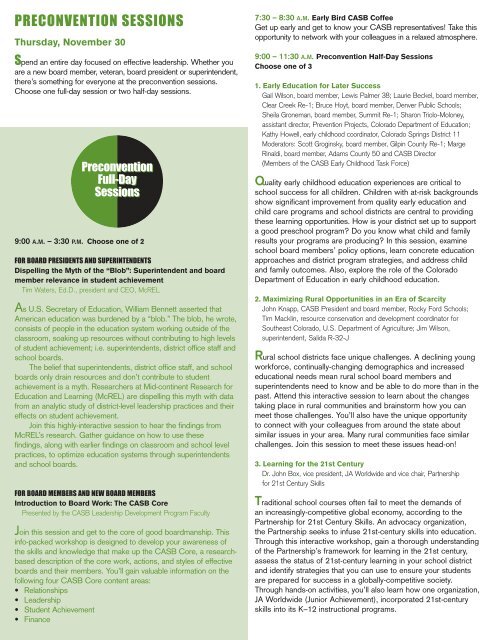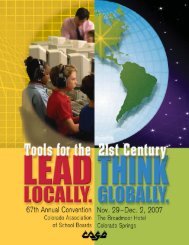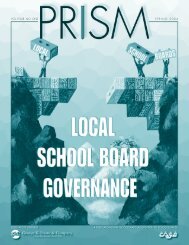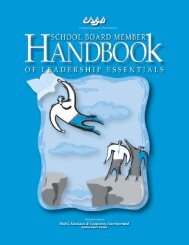At the CASB 66th Annual Convention you will - Colorado ...
At the CASB 66th Annual Convention you will - Colorado ...
At the CASB 66th Annual Convention you will - Colorado ...
You also want an ePaper? Increase the reach of your titles
YUMPU automatically turns print PDFs into web optimized ePapers that Google loves.
PRECONVENTION SESSIONS<br />
Thursday, November 30<br />
Spend an entire day focused on effective leadership. Whe<strong>the</strong>r <strong>you</strong><br />
are a new board member, veteran, board president or superintendent,<br />
<strong>the</strong>re’s something for everyone at <strong>the</strong> preconvention sessions.<br />
Choose one full-day session or two half-day sessions.<br />
Preconvention<br />
Full-Day<br />
Sessions<br />
9:00 A.M. – 3:30 P.M. Choose one of 2<br />
FOR BOARD PRESIDENTS AND SUPERINTENDENTS<br />
Dispelling <strong>the</strong> Myth of <strong>the</strong> “Blob”: Superintendent and board<br />
member relevance in student achievement<br />
Tim Waters, Ed.D., president and CEO, McREL<br />
As U.S. Secretary of Education, William Bennett asserted that<br />
American education was burdened by a “blob.” The blob, he wrote,<br />
consists of people in <strong>the</strong> education system working outside of <strong>the</strong><br />
classroom, soaking up resources without contributing to high levels<br />
of student achievement; i.e. superintendents, district office staff and<br />
school boards.<br />
The belief that superintendents, district office staff, and school<br />
boards only drain resources and don’t contribute to student<br />
achievement is a myth. Researchers at Mid-continent Research for<br />
Education and Learning (McREL) are dispelling this myth with data<br />
from an analytic study of district-level leadership practices and <strong>the</strong>ir<br />
effects on student achievement.<br />
Join this highly-interactive session to hear <strong>the</strong> findings from<br />
McREL’s research. Ga<strong>the</strong>r guidance on how to use <strong>the</strong>se<br />
findings, along with earlier findings on classroom and school level<br />
practices, to optimize education systems through superintendents<br />
and school boards.<br />
FOR BOARD MEMBERS AND NEW BOARD MEMBERS<br />
Introduction to Board Work: The <strong>CASB</strong> Core<br />
Presented by <strong>the</strong> <strong>CASB</strong> Leadership Development Program Faculty<br />
Join this session and get to <strong>the</strong> core of good boardmanship. This<br />
info-packed workshop is designed to develop <strong>you</strong>r awareness of<br />
<strong>the</strong> skills and knowledge that make up <strong>the</strong> <strong>CASB</strong> Core, a researchbased<br />
description of <strong>the</strong> core work, actions, and styles of effective<br />
boards and <strong>the</strong>ir members. You’ll gain valuable information on <strong>the</strong><br />
following four <strong>CASB</strong> Core content areas:<br />
• Relationships<br />
• Leadership<br />
• Student Achievement<br />
• Finance<br />
7:30 – 8:30 A.M. Early Bird <strong>CASB</strong> Coffee<br />
Get up early and get to know <strong>you</strong>r <strong>CASB</strong> representatives! Take this<br />
opportunity to network with <strong>you</strong>r colleagues in a relaxed atmosphere.<br />
9:00 – 11:30 A.M. Preconvention Half-Day Sessions<br />
Choose one of 3<br />
1. Early Education for Later Success<br />
Gail Wilson, board member, Lewis Palmer 38; Laurie Beckel, board member,<br />
Clear Creek Re-1; Bruce Hoyt, board member, Denver Public Schools;<br />
Sheila Groneman, board member, Summit Re-1; Sharon Triolo-Moloney,<br />
assistant director, Prevention Projects, <strong>Colorado</strong> Department of Education;<br />
Kathy Howell, early childhood coordinator, <strong>Colorado</strong> Springs District 11<br />
Moderators: Scott Groginsky, board member, Gilpin County Re-1; Marge<br />
Rinaldi, board member, Adams County 50 and <strong>CASB</strong> Director<br />
(Members of <strong>the</strong> <strong>CASB</strong> Early Childhood Task Force)<br />
Quality early childhood education experiences are critical to<br />
school success for all children. Children with at-risk backgrounds<br />
show significant improvement from quality early education and<br />
child care programs and school districts are central to providing<br />
<strong>the</strong>se learning opportunities. How is <strong>you</strong>r district set up to support<br />
a good preschool program? Do <strong>you</strong> know what child and family<br />
results <strong>you</strong>r programs are producing? In this session, examine<br />
school board members’ policy options, learn concrete education<br />
approaches and district program strategies, and address child<br />
and family outcomes. Also, explore <strong>the</strong> role of <strong>the</strong> <strong>Colorado</strong><br />
Department of Education in early childhood education.<br />
2. Maximizing Rural Opportunities in an Era of Scarcity<br />
John Knapp, <strong>CASB</strong> President and board member, Rocky Ford Schools;<br />
Tim Macklin, resource conservation and development coordinator for<br />
Sou<strong>the</strong>ast <strong>Colorado</strong>, U.S. Department of Agriculture; Jim Wilson,<br />
superintendent, Salida R-32-J<br />
Rural school districts face unique challenges. A declining <strong>you</strong>ng<br />
workforce, continually-changing demographics and increased<br />
educational needs mean rural school board members and<br />
superintendents need to know and be able to do more than in <strong>the</strong><br />
past. <strong>At</strong>tend this interactive session to learn about <strong>the</strong> changes<br />
taking place in rural communities and brainstorm how <strong>you</strong> can<br />
meet those challenges. You’ll also have <strong>the</strong> unique opportunity<br />
to connect with <strong>you</strong>r colleagues from around <strong>the</strong> state about<br />
similar issues in <strong>you</strong>r area. Many rural communities face similar<br />
challenges. Join this session to meet <strong>the</strong>se issues head-on!<br />
3. Learning for <strong>the</strong> 21st Century<br />
Dr. John Box, vice president, JA Worldwide and vice chair, Partnership<br />
for 21st Century Skills<br />
Traditional school courses often fail to meet <strong>the</strong> demands of<br />
an increasingly-competitive global economy, according to <strong>the</strong><br />
Partnership for 21st Century Skills. An advocacy organization,<br />
<strong>the</strong> Partnership seeks to infuse 21st-century skills into education.<br />
Through this interactive workshop, gain a thorough understanding<br />
of <strong>the</strong> Partnership’s framework for learning in <strong>the</strong> 21st century,<br />
assess <strong>the</strong> status of 21st-century learning in <strong>you</strong>r school district<br />
and identify strategies that <strong>you</strong> can use to ensure <strong>you</strong>r students<br />
are prepared for success in a globally-competitive society.<br />
Through hands-on activities, <strong>you</strong>’ll also learn how one organization,<br />
JA Worldwide (Junior Achievement), incorporated 21st-century<br />
skills into its K–12 instructional programs.





